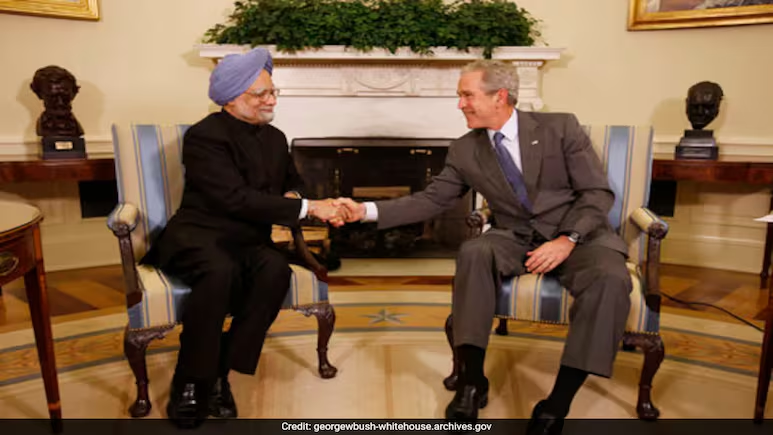Making a statement in Rajya Sabha on March 19, 2005, PM Dr Manmohan Singh had said --
"Sir, the Government has taken note of developments arising from the decision of the Government of the United States of America to deny the request of the Chief Minister of Gujarat, Shri Narendra Modi, for a government visa.
The Government is also greatly concerned by the further decision of the United States to revoke other categories of visas already issued to Shri Modi."
"I share the concern that has been expressed in this matter on all sides of the House. When I came to know of the denial of visa to Shri Modi, yesterday, I immediately instructed our External Affairs Minister to call the US Ambassador and explain to them that we are greatly concerned and we greatly regret the decision that has been taken by the United States Government."
Hon. Members of this August house would be aware of the fact that our Foreign Secretary , yesterday summoned the Deputy Chief of the U.S. Mission in New Delhi to convey strong demarche on the decision of the U.S. Government . Our Government has clearly pointed out our very deep concern and regret over the U.S. decision to deny a visa to a constitutionally elected Chief Minister of a state of our Union.
We have observed that this uncalled for decision betrays a lack of sensitivity and due courtesy to an elected authority.
The U.S. Government has been clearly told of our concern at this development. We have also called for the urgent re-consideration of this decision by the United States Government.
Mr. Chairman, Sir, the American Government has also been clearly informed that while we respect their sovereign right to grant or refuse visas to any person, we do not believe that it is appropriate to use allegations or anything less than due process to make a subjective judgment to question a constitutional authority in India.
"Sir, we agree that this is not a matter of partisan politics, but rather a matter of concern over a point of principle. I think , the Government's prompt and firm response clearly shows our principled stand in this matter," Dr Singh said.
"Bhishma Pitamah of Indian politics Atal Bihari Vajpayee should listen to his conscience and let national interest prevail upon narrow politics,” Dr Manmohan Singh said in March 2008 seeking BJP support for the Indo-US Nuke deal.
And critics said ... since then on it became a "personal mission" for prime minister Dr Singh as he initiated discussions with the Samajwadi Party inviting Amar Singh to a dinner to celebrate four years of the UPA.
India's epochal civil nuclear agreement with the United States in 2008 will remain a crowning glory for Manmohan Singh's prime ministership in the foreign policy domain as it not only ended the country's nuclear apartheid but created a favourable geopolitical configuration.
It's true the civil nuclear deal changed India's overall engagement with the US as it paved the way for building the bonds of a strategic partnership, especially in areas of high-technology and defence.
In an address at a joint session of the US Congress on July 19, Dr Singh elaborated on the need for India-US collaboration in the civil nuclear energy sector and explained New Delhi's impeccable record in nuclear non-proliferation.
"We have adhered scrupulously to every rule and canon in this area. We have done so even though we have witnessed unchecked nuclear proliferation in our own neighbourhood which has directly affected our security interests," he had said.
"This is because India, as a responsible nuclear power, is fully conscious of the immense responsibilities that come with the possession of advanced technologies, both civilian and strategic," Dr Singh said.
"We have never been, and will never be, a source of proliferation of sensitive technologies," he said.









No comments:
Post a Comment